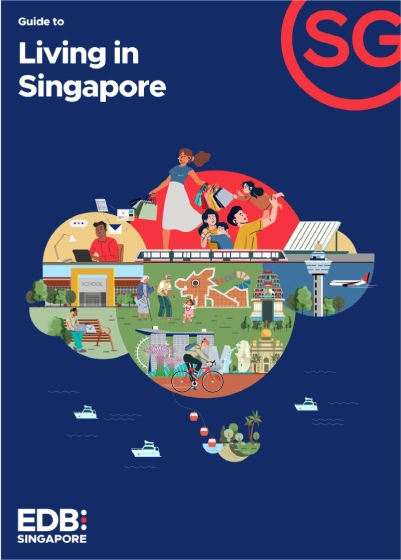Get a snapshot of living expenses in Singapore and find out about the country's healthcare system, getting around, and more.
Download the 2021 Guide to Living in Singapore to find out more

By Vaishali Rastogi, Managing Director and Senior Partner, global leader of Technology, Media and Telecommunications, BCG
In September last year (2020), Chinese tech giant Tencent announced that they would be opening up a regional office in Singapore, with plans to use the country as a base to expand into the region.
For most people who are acquainted with Singapore, this is not such a big piece of news. After all, hundreds of the world's largest companies, such as Google, Facebook and Amazon, have set up their regional offices in Singapore, leveraging on the country's central location, excellent infrastructure, and stable political environment.
But the move was significant – due to the pandemic, tech companies were comfortable with the idea that they could function with their employees remote-working from anywhere in the world, so why did one of the largest Internet companies see the value of a physical location?
The answer lies in dissecting three trends - tech, talent and transformation of the workplace that have arisen due to the global pandemic.
Technology will fundamentally disrupt industries at an accelerated pace
By now, it's almost a cliché to say that Covid-19 has changed the world. Yet, the changes that we have experienced the past year - virtual meetings, elbow taps and masks, among others - are just the tip of the iceberg.
The real change is coming, and it has to do with all things tech. Consumer behaviour, for instance, is fundamentally shifting. BCG’s studies in this space show that consumers are increasing their digital adoption, e.g. first-time users of e-commerce have grown 17-23 per cent across Southeast Asia. Similar trends are seen in digital payments, e-learning and more.
What's more remarkable is that the speed of change has been unprecedented - we have never seen a shift so rapid, enabled by what technology can deliver. And the pace is accelerating, fundamentally impacting every single industry. The result? Companies are doubling down on digital in both customer-facing and internal activities.
Future of talent: From talent gap to talent mismatch
Technological disruption is displacing occupations, shifting tasks and creating demand for new skills.
Over the past year, demand for talent with skills in cloud solutions, data visualisation, data science, IT automation, cybersecurity has skyrocketed. Surveys show that companies are willing to pay very competitively to recruit this talent pool.
But while technical skills are essential, what is also clear is that innately 'human' skills such as creativity, originality, critical thinking, leadership and emotional intelligence will also matter.
The result is not just a skills gap, an area of concern for many governments worldwide before the pandemic. The future of talent will be one of a skills mismatch.
BCG’s research in this area shows that 1.3 billion people are currently either too qualified or under-qualified in the jobs they are working in. Even before the COVID-19 pandemic, our survey showed that one in three people in the OECD countries was working in an occupation completely unrelated to his or her field of study – and not by choice.
Overcoming the skills mismatch is tougher than dealing with the skills gap. It will take re-imagining education systems, shifting mindsets across generations and rethinking of education policies for lifelong learning.
In the meantime, demand for tech talent will continue to outstrip supply, and the drag on productivity will persist.
Transitioning to a new hybrid workplace as the new normal
Working in our pyjamas and dealing with our kids while trying to ensure that the mute button is on is a routine affair for many white-collared workers. The pandemic has prompted a vast global experiment in remote work - some 80 per cent of office workers across the globe say that they have used teleconferencing apps over the past year.
The reality is that this is likely to remain even when offices start to re-open. But more than simply having to deal with remote and flexible working, remote work is transforming the traditional human resource model of many companies.
Companies will embrace more flexible, “blended workforce” models – this means openness on where they source top talent from and expand or contract their access to specialised, highly skilled workers. The hybrid workforce will mean rethinking how they can continue to motivate their staff, boost productivity and keep them immersed in company culture.
Hubs still matter
So, what do these three trends of tech, talent and transformation of the workplace have to do with Tencent and Singapore? They are at the heart of how cities like Singapore, New York, Tokyo and Mumbai can continue to play key roles as hubs of economic activity.
For some, the rise of tech and remote working may point to the fact that there is no longer the need for a physical space. After all, if your top engineer can work productively in Poland, why bother moving her to Shanghai in a costly exercise?
There will also be a shortage of highly skilled global talent as skill needs evolve given digital adoption and companies moving to a borderless talent sourcing model.But hubs like Singapore are more than economic points.
Unlike industrial hubs, which are waning due to fundamental changes in the global supply chain, talent and cultural hubs remain critical nodes in the global economy. Cultural and talent hubs can draw upon their many advantages to continue to thrive in this new world and Singapore is one of these hubs.
One, eco-systems matter, which is why companies continue to need regional aggregation points. Operating in an environment where you can tap one of the most highly skilled workforces and draw talent from top universities and ride on partnerships with fellow leaders in the industry is a massive boon for any company. Singapore has created a conducive ecosystem to strengthen its own local talent base for the future and to internalise the need for lifelong learning. People are committed to training and have the agility to develop skills needed in the future.
Two, companies still value proximity to markets because local culture remains critical. You can't sell to a market if you don't understand it, especially one as heterogeneous as Southeast Asia. The city state continues to be the regional gateway for Asia, with the right policy, regulatory framework and excellent infrastructure for businesses to build its presence in high growth areas.
And three, talent will naturally prefer to live in a politically stable, well-connected place and one that can offer a high quality of life. As the most liveable city for Asian expats, companies can find a readily available pool of talents in Singapore, which will remain essential under the blended workforce model.

Download the 2021 Guide to Living in Singapore to find out more
These factors are why my company BCG decided to use Singapore as a regional talent platform and pushed ahead despite COVID-19. We set up BCG Digital Ventures to incubate and disrupt new spaces for corporates. We started our innovation centre in Singapore and used it as a regional talent hub for so many of the new skills that we continue to invest in.
For all the change and disruption that has happened, I believe that some things remain: there are still enormous opportunities for Singapore to capitalise on and play a pivotal role in the global economy, just as it has over the past five decades.
This is the third of a 3-part series featuring the views of business leaders on a post-COVID world and the role Singapore plays as a business hub. The views reflected in this article are of the author’s own.